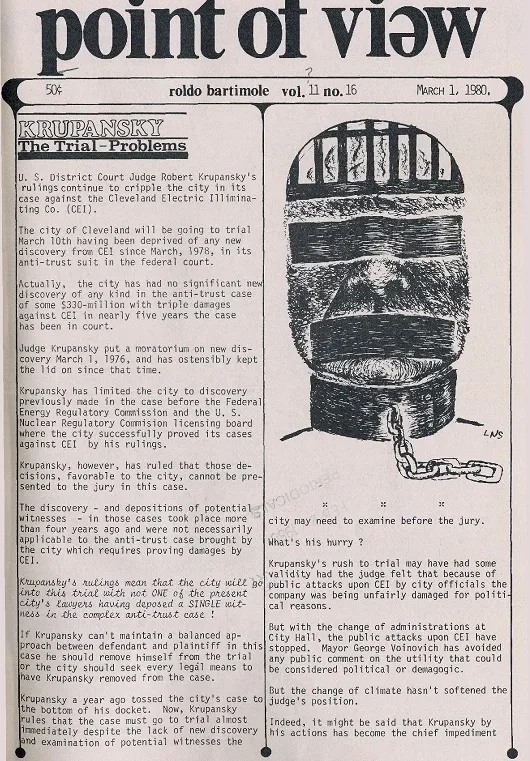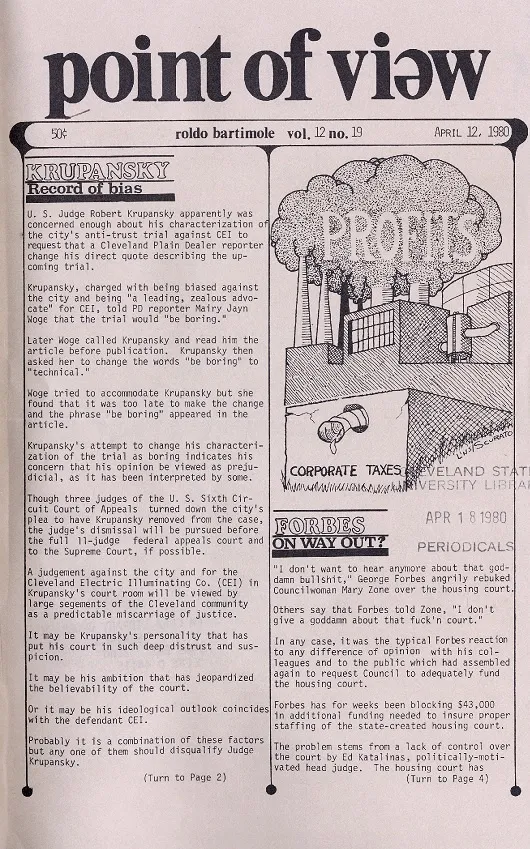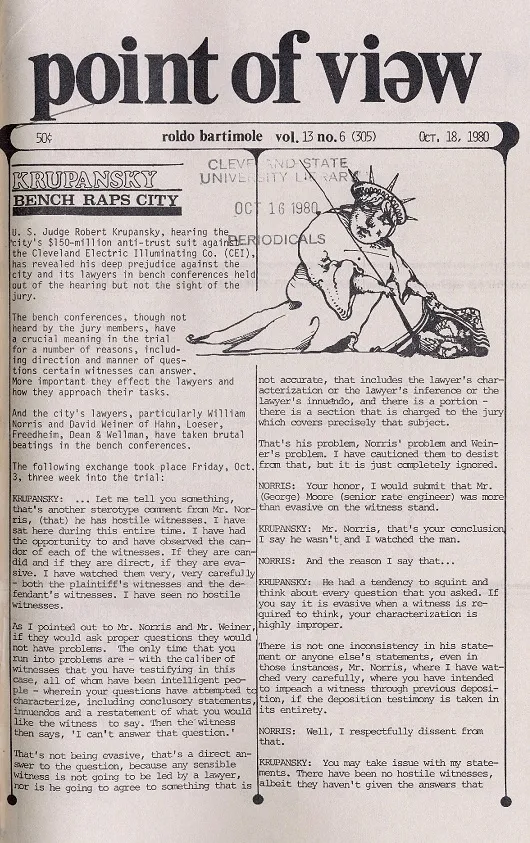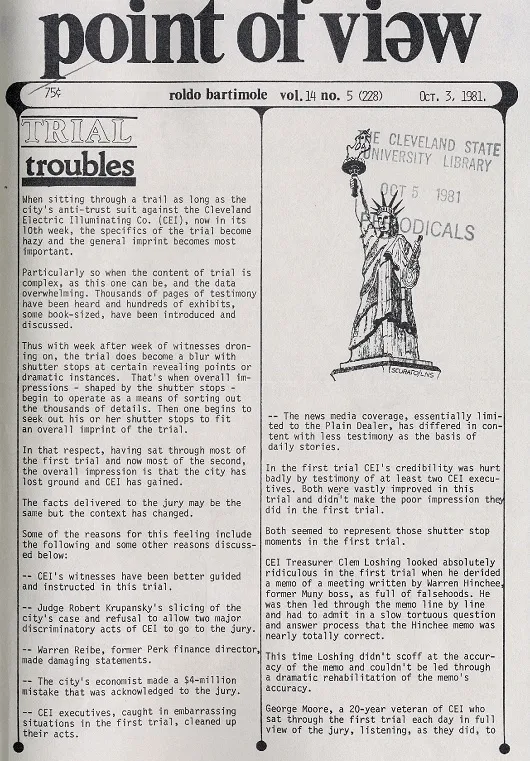Point of Reviəw: CORP’S. BRIBERY DEMANDS CORP’S. PUNISHMENT
Image by Angelo Maneage
Roldo Bartimole is an independent journalist who started a political newsletter in 1968 following the assassination of the Rev. Martin Luther King, Jr. The bi-weekly newsletter, Point of View, ran from June 1968 to December 2000. The four-page sheet dealt with city politics, business, charity, and civic behavior in Cleveland, Ohio. For the last 21 years Bartimole has been writing for alternative newspapers and websites, particularly Have Coffee Will Write. In September 2021 he decided at 88 he would write no more. Cleveland Review of Books is pleased to republish selections from Bartimole’s extensive work here, in an ongoing series, Point of Reviəw.
Originally Published on July 23, 2020 in Have Coffee Will Write.
The corporate culture of the Cleveland Electric Illuminating Co. is alive and well.
And as corrupting as ever.
FirstEnergy, its daddy, retains the ability to debase and disgrace legislators supposedly monitoring their behavior. CEI is now a subsidiary of the company.
The $60 million buyoff of Ohio Speaker Larry Householder and crew by so-called Company A, the BRIBER, help the Republicans, including Gov. Mike DeWine, bundle and pass a consumer-payout by you and me. An estimated billion and a half dollars. It needs to be revoked.
Gov. DeWine belatedly understood this and has asked that it be revoked. Why did it take a day?
I wonder if we’ll ever see the Cleveland media daily march Householder and pals, along with some corporate criminals, walking the march, as they did former Cuyahoga County councilman Jimmy Dimora. Almost daily.
What a message that would send.
And wonder if we’ll they ever get jail sentences as Dimora got (28 years). No wrist slap, to the head.
Bribery of a public official should be a major crime, punishable by a hefty jail term for top corporate officials. They have the responsibility to see that bribery cases like the Householder charges make do not happen.
This case involving a $1.3 billion dollar bailout isn’t handled by clerks in a corporation. They go to the top.
I called House Bill 65 last October Mafia-style legislative work. How true that is now, according to charges of the U.S. Attorney’s office, southern district of Ohio.
Now we’ll see how the media treat this conspiracy. Not, I am sure, as the Point Of Viəw saw CEI and Squire-Sanders actions in Cleveland. The press shies away from calling out corporate criminals. That forces them to be even more brutal toward these dirty politicians.
Ask Jimmy.
This Look Back first appeared last October as HISTORY OF CEI/MUNY LIGHT(S) CLEVELAND RULERS.
The HB 6 utility bailout bill gives a glimpse of how our private interests operate—Mafia style. It reveals enough about the strings of power to show how power works. In Cleveland. Then and now.
The utilities, as visible to anyone with a TV, will lie and distort with impunity. No one monitors the lies they tell. The TV ads tell the story.
They are assured by tradition that the news media will do nothing to stop them. They will run the lies as if true.
It shouldn’t be radical to tell the truth. Yet it is.
I have had a history with our local electric utility in particular. It’s one of corruption that goes beyond the utility itself. It went as high as a federal judge and a prominent law firm.
So as I LOOK BACK once more, I start with a May 1978 issue, Vol. 10, No. 22 of Point Of Viəw. It revealed acts by Ralph Besse, Cleveland Electric Illuminating Company chairman, former Squire, Sanders & Dempsey lawyer, and a law firm returnee in retirement. Squires also represented CEI in the trials.
Besse demanded his CEI executives read and follow Nazi Field Marshall Rommel as a guiding light for their business dealings. Yes, a Nazi general. One executive objected (one honest man) and he was soon dumped.
Moving to March 1980, Vol. 11, No.16, Judge Robert Krupansky began to rule favorably for CEI against the city. Cleveland had sued the utility. It became a long running dispute before the biased judge.
The issue outlines Krupansky’s move to bar the city from any new discovery in a $330-million (triple damages, however, figure changes as parts of suit are dropped) suit against its competitor. Decisions by federal agencies favoring the city were barred from the ant-trust suit by Krupansky. The jury did not hear of them.
Judge Krupansky himself revealed concern about his bias.
I wrote in April, 1980, Vol. 12, No. 19 how the judge, after telling a PD reporter something, realized it exposed his bias. He called the reporter to try to get the offending comment out of the story. It was too late.
Krupansky told the reporter on record that the upcoming city trial against CEI would be boring. Not exactly how a judge should pre-judge his role. Krupansky knew he had erred.
As the trial started later in Sept. 1980, Vol. 13, No. 4 CEI’s, lead lawyer John Lansdale admitted in open court that CEI had indeed refused to wheel (deliver) electricity provided by the New York utility at cheap prices through its lines to Muny Light. “We refused…it would have given Muny cheaper power,” said Lansdale. How is that for honesty.
Can we go home now, Judge? It’s anti-trust. I guess not.
The trial became a trial for the city’s lawyers as Krupansky, especially in bench conferences, dealt the city lawyers morale-damaging blows.
But in this Oct. 1980, Vol. 13, No. 6 issue, much of the city’s case is told in detail with extensive debate outlined for the reader. It holds eight full pages of trial testimony.
A sabotage move by CEI, hiring a law firm to hire a third party to secretly sue the city, never would reach the jury. It was blocked, of course, by Judge Krupansky. The CEI move damaged Muny Light by delaying its ability to gain an interchange. It would improve its service. The jury would not hear of it. Krupansky wouldn’t allow it.
Despite Krupansky’s roadblocks the jury didn’t rule in favor of CEI. Neither, of course, for the city. It ended a hung jury. Five for the city; one with CEI. I wrote at the time, based on the feelings of the jurors, that the one holdout did so, as I wrote then “for personal reasons.” Not on the record.
The headline of the Dec. 1980, Vol. 13 Nos. 9 & 10 issues: Do it again.
I had written that the case would keep writers busy and predicted a book in 20 years. None has been written. Nor likely would one. It should be studied by law students. I hope this is preserved.
I asked former CEI chairman Elmer Lindseth if he ever thought corporate officials would have to appear before a federal judge om these matters. He paused, smiled and said, “The times are different and things change.” Times were changing but not enough.
With a hung jury it now was up to the city whether it would pursue this long, bitter fight. A decision would not be made by Muny’s champion Dennis Kucinich. He was defeated for mayor by Republican George Voinovich who took office in 1980. But Voinovich still worried about Kucinich’s popularity. Voinovice decided to continue the suit.
CEI’s lead lawyer was John Lansdale. “Cactus Jack” to his friends. The nickname gives one an apt description of the man. He had been in charge of security at the Manhattan project when the U. S. developed the nuclear bomb during WWII.
His constant objection to questions by city lawyers and his longer questions of witnesses ate up time. The pressure must have been great for him. He even physically pushed a city lawyer during a recess. No penalty.
My notes for issue Vol. 14, No. 2 of Aug. 1980, indicated Lansdale’s antics. “Lansdale jumping up and down and finger pointing. Lansdale animated and loud enough for the jury to hear… Lansdale angrily punches air…Lansdale objects angrily.”
The first and second juries, especially the foreman and woman, were starkly different. The foreman of the second jury was openly Sympatico with Krupansky. It was the opposite in the first trial as the forewoman showed openly, she favored the city’s complaints. Her vote fell that way.
Krupansky’s role loomed constantly over the trial. His role was one of intimidation of city lawyers. The jury in this second trial picked up on his act. He had made his feelings quite clear even before the trial. He forced Kucinich to pay $14 million in disputed costs to CEI. It happened to be just about what the city suffered later in the year. Cleveland fell into default. In the past, banks had automatically rolled over these city notes.
In this issue, Vol. 14, No. 3 of Sept. 1981, reveals the numerous bench conferences called by Krupansky as he badgered city lawyers. I wrote that the “intimidation factor” of Krupansky hung over the city lawyers. I noted that Krupansky in the corridor outside the courtroom, with reporters within hearing, telling one city official that he was doing a good job. In bench comments, however, Krupansky saw him as “deceptive and lacking in ethics,” I wrote.
It was clear that veteran lawyers with backgrounds of Lansdale would have little or no respect for the city’s lawyers from Hahn, Loeser, Freedheim, Dean & Wellman (now Hahn Loeser). The city’s lawyers were younger and not nearly as experienced.
However, the trial was in its 10th week with thousands of pages of testimony. CEI’s witnesses were better prepared this time. Judge Krupansky continued his destructive work. He ruled out of hearing two damaging acts he had allowed in the first trial.
In this issue of Oct. 1981, Vol. 14, No. 5, Krupansky continued his pro-CEI actions. Here he ruled out damages the city incurred in the loss of an 85-megawatt unit due to CEI actions. It was allowed to go to the jury in the first trial. Krupansky also ruled (CEI’s First Amendment right, he said) that the city couldn’t reveal a deal where city legislation ruined a bond sale for Muny. Councilman Frank Gaul, utilities chair, purposely damaged a bond legislation that would have helped Muny. Gaul and his son went to work for a CEI-related firm subsequently. Krupansky and the second trial’s foreman also seemed to have a love affair going. They exchanged smiles appropriate to their bias.











